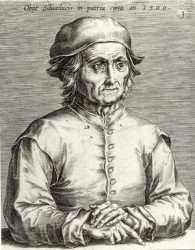
Fuchs 1966
“De uitzonderlijke Jeroen Bosch” (R.H. Fuchs) 1966
[in: Brabantia, XV (1966), pp. 233-236]
[Also mentioned in Gibson 1983: 162 (H24)]
Recent hypotheses have created a lot of confusion around Bosch. The crux of that confusion is the irrational aspect of Bosch’s art that we in the 20th century recognize as ours. Because of this we experience the painter as a contemporary: he depicts the ineffable fears and desires of our time.
The irrational aspect of Bosch’s paintings means in visual terms that his compositions don’t seem to be based on logical principles of structure, as is the case in the form of Dante’s Divine Comedy. The emotional impact of Dante is the result of the rational technical quality of his authorship. Bosch’s emotional impact is caused by the realism and the artistic precision with which he paints his hybrid creatures on panel.
[explicit]